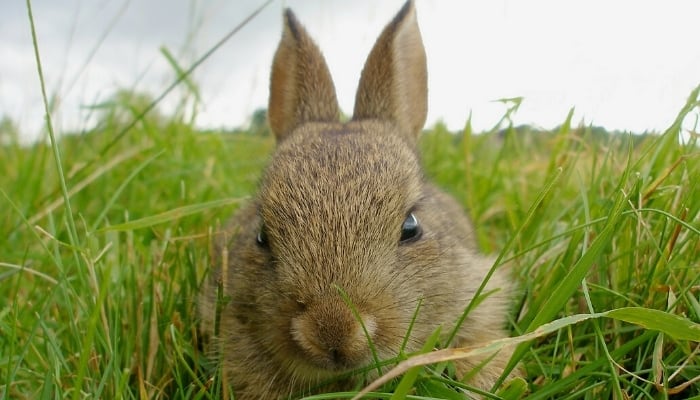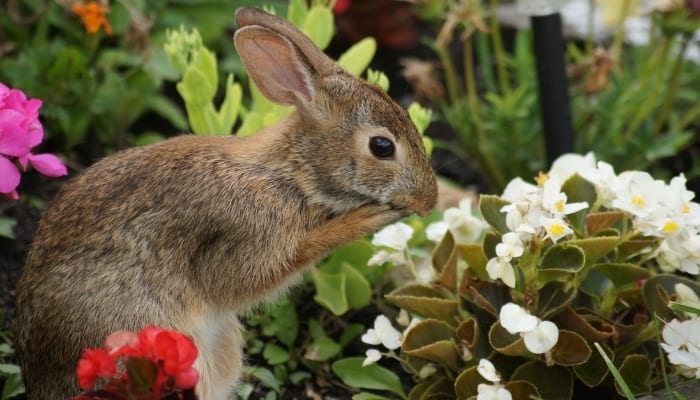Many gardens are enhanced by the presence of begonias. These flowers are known to attract pollinators and beneficial insects, making the garden a vibrant celebration of various hues and bustling with life.
But along with that bustling hum of pollinators, uninvited visitors can crash the party. Rats, squirrels, slugs, and snails find begonias too delicious to pass up.
Do rabbits eat begonias? Rabbits typically don’t like the taste of begonias, especially since they are toxic to rabbits. If food is scarce, some rabbits will nibble on begonias and damage more than they snack on. Even when there’s an abundance of food, mischievous rabbits will sometimes dig up begonias for no apparent reason.
Begonias are not a recommended food for rabbits, but wild rabbits may try to eat anything. Read more to find out how to protect your begonias against rabbits and other wildlife.
Begonias and Rabbits – What To Know
It’s safe to say that begonias and rabbits don’t mix. Rabbits will avoid eating begonias as a general rule.
Although rabbits generally avoid eating begonias, the flowers are not safe from their destructive digging habits.
Are Begonias Rabbit Resistant?
Begonias are not a surefire way to keep rabbits away from your garden. Many rabbits won’t even get close to your begonia bedding, yet others relish the taste of the supple stems and young leaves of the begonias.
It’s not clear why rabbits are divided when it comes to snacking on begonias. However, you should treat begonias as a potential target for local rabbits and do your best to keep them out of the garden.
Whether or not begonias will bounce back after rabbits have feasted depends on how much of the plant was consumed and how healthy the plant was before the attack.
Are Begonias Toxic?
Begonias are toxic not just to animals but to humans as well. Most of the toxins are in the roots and the parts of the plant right under the surface of the soil.
Tuberous begonias are even more toxic since the tubers have high concentrations of toxins. That said, you shouldn’t rely on that toxicity to repel rabbits.
The four-legged pests munch on the leaves, stems, and sometimes flowers of begonias but not often on the roots and tubers.
When Rabbits Might Eat Begonias
Rabbits don’t consider begonias either delicious or staple food. When the garden has a veggie patch, some fruits, and weeds, rabbits will steer clear of begonias.
However, when there’s no other source of food in the garden, begonias become too irresistible for rabbits. A hungry rabbit will eat anything that grows out of the soil, no matter how distasteful.
What Other Animals Will Eat Begonias?
While rabbits generally avoid begonias, other animals would not miss a chance to sample those delicious flowers.
Squirrels and rats are notorious for favoring begonias over other plants in the garden, not to mention a plethora of other pests as we’ll see later.
Do Deer Eat Begonias?
Like rabbits, deer don’t consider begonias an ideal food source. They would go through the garden or yard looking for other food to munch on. If they find it, they’ll have their fill and move on.
Otherwise, they might snack on the begonias only because they’re too hungry. So, begonias are not really safe from deer even if most deer won’t see the flowering plants as their first choice of food.
What Is Eating My Plants? How To Tell
If you wake up in the morning to the sight of your begonias in disarray, you need to take a closer look at the plants and treat the whole bedding as a crime scene.
Based on the damage to the plants, you can tell the type and even size of the animal that ruined the flowers.
If the stems are broken, chewed, or trampled on, then you might be dealing with deer, rabbits, or squirrels. Rats are too small to trample on the plants. They just chew on the stalks and leaves.
If the damage to the plants is limited to holes in the leaves and stems, then you might have a pest infestation.
Spider mites, whiteflies, aphids, thrips, scales, earwigs, and mealybugs are some of the common pests that are attracted to begonias, but none of these insects chew holes in plant leaves.
Visible holes and evidence of chewing are the work of caterpillars, grasshoppers, some types of beetles, and slugs. Spray the begonias with neem oil or an organic herbicide to eliminate the pests.
Rabbits bite stems at an angle, and the bite is very clean and sharp, almost as if caused by a pair of clippers.
Deer feeding damage has a ragged appearance because they tear leaves and stems with their mouths.

How To Protect Your Begonias From Rabbits
Whether the rabbit community that pays a visit to your garden favors begonias or not, you don’t want to wait and find out.
It’s better to take precautions and protect your begonias from any possible attack by a hungry or playful rabbit. Here’s the lowdown of the best ways to fend off such attacks:
1. Grow Them in Elevated Planters
Although rabbits are agile and crafty, they usually prefer easily accessible plants that don’t require a lot of hopping and climbing to reach them.
One way to protect your begonias is to plant them in elevated planters. Anything above 3 feet is beyond the reach of the short-legged rabbits, which prefer to stay on the ground to make a quick escape at the first sign of danger.
2. Install Rabbit Fencing
Fences can be quite effective against rabbits and is an alternative to growing begonias in elevated planters.
Fences are easy to install and remove, so they won’t change the landscape as elevated planters will.
Make sure the fence is at least 4 feet tall and is buried in the ground at least 6 inches deep. This will deter hungry rabbits from digging under the fence to access the begonias.
3. Make Individual Cages for Plants
Individual cages are not an ideal option to protect large areas from wildlife, but if you only have a few begonias and nothing else seems to deter the persistent rabbits, then install an individual cage for each plant.
Make sure that the cage towers over the top of the begonia but doesn’t cut off sunlight or fresh air completely. Keep the top of the cage open to improve air ventilation.
4. Sprinkle Soap Shavings Around Plants
Rabbits dislike soap. It’s not just that the soap odors are offensive to their twitching noses, but the soft soap shavings are slippery and stick to their paws, making it hard for them to dig and make a run for it when a dog or a fox shows up.
Take advantage of this natural dislike of soap to deter rabbits from getting near the begonias. Replenish the soap shavings when it rains.
5. Plant Onions Nearby
Onions are natural rabbit repellents. Their offensive odors are too much for the rabbits, so they usually avoid the garden altogether.
Make sure to start the onions right around the same time you plant begonias. By the time begonias bloom, the onions will be mature enough to send their odors in every direction and keep rabbits and other pests out of the area.
6. Sprinkle Cayenne Pepper on Plants
Rabbits, like many other small animals, rely on their sense of smell to guide them toward food and avoid lurking predators. You can use this fact to your advantage by giving the rabbits something to sniff that they wouldn’t find pleasant at all.
Cayenne pepper is so hot it will keep the noses of the rabbits twitching for quite a while. Most likely, the rabbits won’t come near the begonia bed again.
Related Questions:
Do Rabbits Eat Impatiens?
Impatiens are bright flowers that offer no defense against rabbits. They’re not toxic like begonias and they taste as good as they look (if you’re a rabbit).
Rabbits feast on all varieties of impatiens and could finish up a whole patch in one sitting.
Do Rabbits Eat Geraniums?
Geraniums are not as tasty as impatiens, but a hungry rabbit wouldn’t mind snacking on them when there’s no other food around.
In the early spring, the leaves and stems of geraniums are soft and edible. Mature geraniums are usually safe from rabbits.
Do Rabbits Eat Petunias?
Petunias have tender shoots in the spring. Rabbits will eat those shoots before they mature. By the time petunias bloom, rabbits tend to lose interest in them.
Do Rabbits Eat Salvias?
If you grow salvias in your garden, then you have nothing to worry about from either rabbits or deer. The odor of salvias repels both of these animals.
Do Rabbits Eat Coleus?
Rabbits attack and feed on coleus when the plants are young. They pull them out with their strong teeth and eat every last part of the young coleus.
Protect the plants with cages or fences, or sprinkle soap shavings or cayenne pepper around the flower beds to deter the rabbits.
Conclusion
Most rabbits have no interest in begonias in general. Begonias have toxic roots and are neither tender nor delicious, but some hungry rabbits will still snack on begonias in the absence of better food in the garden.

